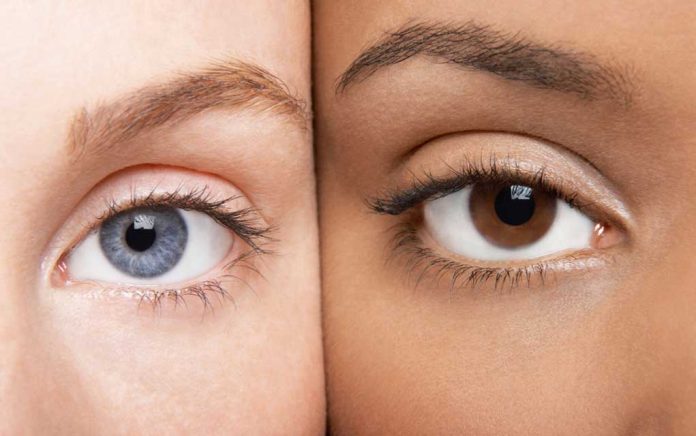
(HealthyResearch.com) – It’s often said that eyes are the window to the soul. As it turns out, our eye color may also be a potential indicator of predisposition toward specific health problems. Let’s take a look at what the research says about eye color and potential health risks.
Light Eyes
Blue eyes stem from a genetic mutation that causes them to have less melanin, or pigment, than brown eyes. Green eyes also have less melanin than brown eyes, with gray eyes having even less than blue eyes.
If you have one of these eye colors, you may be more likely to experience the following health conditions:
- Skin cancer – Having light eyes can increase your odds of developing malignant melanoma, the deadliest form of skin cancer. The risk is highest for those with blue eyes, a pale or freckled complexion and red or fair hair, according to the World Health Organization.
- Eye cancer – Eye cancer, or uveal melanoma, is slightly more common in people with light eyes, according to the American Cancer Society.
- Diabetes – Multiple studies have found that blue-eyed people are more likely to have type 1 diabetes. More research is needed to determine how high the risk is. One study from Sardinia, Italy, found a 3.2% higher risk, while researchers in Lazio, Italy, found a 12% higher risk.
- Alcoholism – One study found that people with light eyes were 54% more likely to experience alcohol dependency than those with dark brown eyes. The researchers found that blue-eyed people were the most likely to be alcoholics, with 80% higher odds. The connection between light eyes and alcoholism still requires more research.
- Macular Degeneration – People with light eyes are more likely to experience macular degeneration because the lack of melanin provides less protection from harmful UV rays, contributing to the condition.
- Endometriosis – Blue eyes have been linked to higher instances of endometriosis. It’s believed that a combination of genetics and low vitamin D levels due to photosensitivity may be to blame.
Dark Eyes
As you’ve probably guessed, brown or black eyes are considered to be dark. Hazel eyes also fall into this group. While these eyes are technically light brown, often with green and gold specks, hazel eyes have nearly as much melanin as brown eyes.
If your eyes fall into the dark eyes category, you may be more prone to the following health problems:
- Cataracts – An Australian study found that people with brown eyes were up to 2.5 times more likely to develop cataracts, possibly because the iris’ darker color absorbs more light, causing the lens to heat up and eventually become cloudy.
- Vitiligo – Research from the University of Colorado School of Medicine found that people with brown or tan eyes were 43% more likely to have vitiligo (as opposed to 30% with green or hazel eyes and 27% with blue or gray eyes). Having vitiligo also increases your risk of autoimmune diseases including lupus, rheumatoid arthritis and thyroid disease.
- A lower pain tolerance – Having brown eyes could mean you have a lower threshold for pain. A study analyzed the pain levels women experienced during childbirth. Researchers found that those with brown eyes and hazel eyes were less tolerant of the pain they endured than women with blue and green eyes.
- A higher sensitivity to alcohol – It’s believed that the reason people with brown eyes are less prone to alcoholism than their blue-eyed counterparts is because they tend to have a lower tolerance to alcohol. If you find yourself more inclined to hangovers or can’t handle as much alcohol as your blue-eyed friends, this could be why.
- Seasonal Affective Disorder (SAD) – Research suggests that women with brown eyes are more likely to experience SAD, or seasonal depression. Having brown eyes may also make you more likely to experience mood changes than those with blue eyes.
While the genes associated with your eye color can put you at risk of certain health conditions, it’s important to keep in mind that eye color alone doesn’t determine what health problems you will or won’t experience. But being aware of what health conditions your eye color may make you more prone to can help you stay on top of your health. If you suspect that you may be experiencing any of the health problems mentioned above, be sure to contact your healthcare provider.
~Here’s to Your Health & Safety!
Copyright 2020, HealthyResearch.com
















